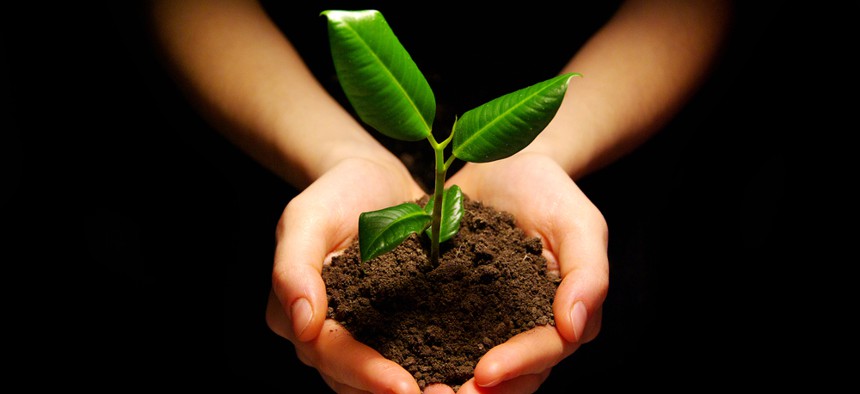
Image via Pakhnyushcha/Shutterstock.com
The Health Benefits of Working With Your Hands
The scientific reasons why knowledge workers need to do more with their hands.
In my work, I rarely see tangible, physical benefits that result from my efforts. That’s part of the reason I seriously enjoy physical labor and yard work. After a few hours in the yard, I can actually see evidence of my achievements. I’ve know for years that when spring rolls around, I look forward to mowing, mulching, wedding, planting, pruning, etc. As I dig in the dirt, my mind declutters. Distractions and stress diminish as the dirt accumulates under my fingernails. There are lots of anecdotal reasons for this spike in wellbeing—but I was curious if there was any science to support my own experience. Research shows that bacteria naturally found in soil, called Mycobacterim vaccae:
- Activates a group of neurons that produces the brain chemical serotonin. Serotonin – at appropriate levels, is key for regulating mood and contributes to better emotional stability and a better social life, not to mention decreased risk of cardiovascular disease.
- Contributes to increased productivity (speed) and less anxiety.
In fact, it’s not just about digging in the dirt. There are compelling arguments about the benefits of working with your hands. Read the book, “Shop Class as Soulcraft” to learn more. The author, a former knowledge worker who gave it all up to open a motorcycle repair shop, explores the dangers of the knowledge economy and getting farther and farther away from being able to actually do useful things.
Other research points to effort driven rewards circuit that:
helps us effectively meet emotional challenges, thus ameliorating depressive symptoms to some extent. Brain-wise, moving our hands activates larger areas of the cortex than movement of other parts of the body such as our legs or back muscles. And more importantly, what drives that effort-driven rewards circuit are physical activities that involve our hands, particularly activities that produce tangible products that we can see, touch, and enjoy. All of this helps alleviate underlying symptoms associated with depression.
Why should we care about any of this? Though presumptive, I’m betting most of us are not producing tangible products as part of the work we do. So, for at least 8 hours a day we are missing out on the scientifically proven benefits of working with our hands. What can we do about it?
- Make it a priority to do stuff with your hands when you are not at work. Maybe you don’t have a garden to dig in to stir up those bacteria that activate neurons. Instead, try doing an art project. Or ditch the handyman, grab a hammer, and handle one of those home improvement tasks on the to-do list.
- Create tangible things at work that represent the knowledge work. For example, if you are creating a strategic plan, try using wooden blocks that represent the plan. As you move along, build a structure with those blocks to represent the pieces of the plan. It won’t replace digging in the dirt or fixing a car; however, it might give you the sense that your efforts are resulting in something tangible.
- Offer incentives and rewards for accomplishing goals. While I’m a huge proponent of the value of acknowledgement, identify tangible/physical things that are awarded once a certain goal is accomplished. That whole carrot thing might be more important than we think
Don’t Have Access to Dirt? Try Singing
You don’t have to get down and dirty to achieve similar results. The benefits of singing and music are so voluminous. It turns out that whole “silly touchy-feeling” idea of singing kumbaya actually has some pretty significant benefits.
Consider that singing:
- Builds Trust and Boosts Your Immunity. A June 2008 article published by the National Institutes of Health (NIH) lays out compelling scientific evidence of the physical and mental health benefits of singing.
- Allows You to Breathe More Easily and Alleviate Stress. While breathing more easily may not on the surface seem all that important, it’s huge. It helps with fatigue and is a powerful ally in dealing with stress. Singing also helps to increase respiratory health and strengthen lung function.
- Is Part of Our Evolutionary History. In addition to releasing the “feel good hormone (Dopamine) and bonding hormone (Oxytocin), singing is a fundamental element of our evolutionary history. Singing has played a significant role in oral traditions and even in organizations such as IBM.
Check this out:
Dusolina Giannini, dramatic soprano of the Metropolitan Opera Association, was vacationing in Europe in 1938 when IBM's president, Thomas J. Watson, Sr., was on a business visit to the continent. At his invitation, Miss Giannini attended a dinner at Bad Gastein, Austria, given in honor of IBM representatives from 25 European countries and their spouses. Miss Giannini, who entertained the gathering with selections from her most famous roles, was so impressed with the IBM spirit, that she called Tom Watson the following day to propose that she ask her brother, Vittorio Giannini -- a composer of considerable renown -- to write an IBM anthem. The composition premiered in New York City at the banquet of the 1938 Hundred Percent Club, May 4, 1939, and was sung by the entire assembly:
Lift up our proud and loyal voices,
Sing out in accents strong and true,
With hearts and hands to you devoted,
And inspiration ever new;
Your ties of friendship cannot sever,
Your glory time will never stem,
We will toast a name that lives forever,
Hail to the I.B.M.
So, while you may not be ready to write a theme song/anthem for your organization, that whole kumbaya thing might help you take better care of yourself.
Whether digging in the dirt, singing out loud or combining the two and whistling while you work, the point is that you should do the things you know, and that science has shown, will make you feel better. Your health and wellbeing may be the most important strategies for not just surviving, but thriving, in these times of high stress, dissatisfaction, frustration, and uncertainty.
Image via Pakhnyushcha/Shutterstock.com
NEXT STORY: 6 Ways to Get Important People to Email You Back







